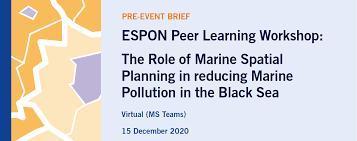The Black Sea has to deal with many threats such as overfishing, marine pollution, uneven development of aquaculture and invasive species.
However, the highest priority should be given to marine pollution, as the Black Sea is considered as one of the most heavily impacted seas by human activities in the world. To make things more difficult, scientific knowledge of the Black Sea’s ecosystems is quite limited compared to other seas. Due to this lack of evidence in combination with a large amount of pollution sources, it is difficult to directly determine the exact impact of each human activity.
Since the cross-border Convention on the Protection of the Black Sea was established in 1992 and the subsequent creation of the Commission for the Protection of the Black Sea Against Pollution, several cross-border programmes between Black Sea states have emerged.
These programmes either aim to develop scientific evidence related to marine pollution through increased monitoring or to enhance regional cooperation to protect coastal and marine environments. The Strategic Research and Innovation Agenda for the Back Sea (2019) focuses on a common approach by integrating Land-Sea Interaction in the deep basin, trigger ocean-engaged citizens and increase incentives for innovation in the blue sector.
While, overall, these initiatives are positive, they remain focused on the cooperation between states located around the Black Sea. Different forms of cooperation around other European seas exist and have showed promising results. Therefore, some practices and strategies applied in these other regions could be interesting to explore in the Black Sea.
ESPON has already addressed the problem of marine pollution from the larger perspective of Marine Spatial Planning (MSP) and Land-Sea Interaction (LSI), or from a more area-focused perspective, such as the Territorial Scenarios for the Baltic Sea Region (BT2050).
This peer-learning workshop will gather different experts and academics - from ESPON-projects and other EU research projects - with key stakeholders from the Black Sea and intend to identify common experiences and good practices.
The main objective of this peer learning workshop (PLW) is to explore the applicability of marine pollution management strategies of other European seas in the Black Sea context. While these practices could potentially be interesting, they probably cannot be applied directly. The situation in the Black Sea is not only determined by the environmental particularities but also by the relations between the numerous actors engaged in different activities.
Three questions will lead the presentations and the following discussions during the peer learning workshop:
1- What are the environmental specificities and the stakeholder characteristics that define the situation in the Black Sea with regard to marine pollution?
2- What practices and strategies from other European seas are relevant to addressing the issue of marine pollution in the Black Sea?
3- How should these practices be adapted in order to be applicable in the context of the Black Sea?
The territorial evidence and policy recommendations from ESPON projects will deliver the information needed about strategies applied in the North Atlantic region and the Baltic Region.
Other external researches will bring a better understanding of the environmental situation in the Black Sea. Finally, the local stakeholders will reflect on what and how those strategies could be implemented in the Black Sea.

